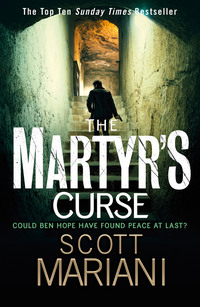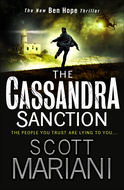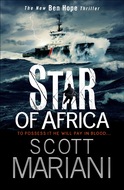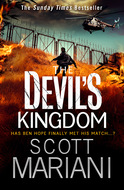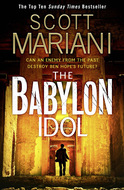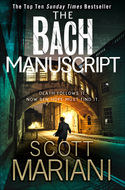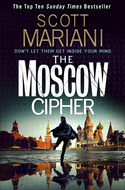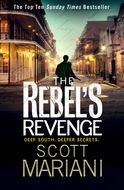Kitap dosya olarak indirilemez ancak uygulamamız üzerinden veya online olarak web sitemizden okunabilir.
Kitabı oku: «The Martyr’s Curse», sayfa 4
Chapter Six
That evening before church, Ben sat by candlelight in Père Antoine’s cell. The chess pieces cast flickering shadows across the board as the two of them faced each other, both deeply involved. Their weekly game had become a welcome part of Ben’s routine and he’d felt himself grow closer to the prior, even if the old monk had turned out to be a fiendish player and nearly always beat him. Ben’s black army was in serious trouble again, and he was damned if he could think of a way to thwart those white bishops ganging up on his queen. He pulled her back out of immediate danger, exposing his remaining rook to enemy forces. Nothing he could do to prevent the sacrifice. War is hell.
‘Thank you again for agreeing to drive the truck tomorrow,’ Père Antoine said as he nonchalantly captured the rook and set it down among his growing collection of Ben’s lost men.
Ben shrugged, as if to say it was nothing. He contemplated his losing position for a moment or two, then said, ‘I made an interesting discovery today, Father. One of the passages down below leads into some kind of chamber, but it looks like it’s been walled up.’
The old man’s eyes flicked up from the chessboard, fixed on him for a moment and then lowered again. ‘May I ask what led you down there?’ he asked quietly. His expression was inscrutable.
‘I was just exploring,’ Ben said. He didn’t mention Roby, or the novice’s reason for hiding down there. ‘I wondered what the chamber had been used for, if anyone still knows.’
‘That place has not been used for a long time,’ Père Antoine said.
‘That’s what I thought.’ Ben backed his queen another few steps out of trouble and launched a tenuous offensive against the white king. ‘There’s a lot of dust and cobwebs down there. And other things that I’m sure wouldn’t have been left lying around if it was often visited.’
Père Antoine didn’t ask what other things. Ben wondered if that was because he already had a good idea what they might be.
‘A lot of history in this place,’ Ben said after a long beat of silence.
‘Indeed there is,’ the old man replied, gazing at the board.
‘A whole honeycomb of tunnels. Makes you wonder where they all lead. Maybe there are more chambers you don’t even know about.’
‘No. There is just one.’ Père Antoine looked uncomfortable. He shifted a knight and Ben’s offensive suddenly began to look like another retreat. ‘I would respectfully ask you not to go there again.’
‘In case it’s unsafe? Is that why it was walled up, to prevent a collapse?’
The old man pursed his lips, peering at Ben over the chess battlefield. ‘It is a place we here prefer not to speak of,’ he said, his voice barely above a whisper.
It didn’t seem appropriate to ask why. ‘I didn’t realise. I’m sorry.’
‘You were not to know, my son. Every place has its secrets from the past. Even here, some things remain that ought to be forgotten.’
‘Secrets?’
‘And ghosts. Things that should be left undisturbed.’
‘I don’t believe in ghosts.’
‘Yet they haunt you still,’ the old man said with a faint smile. ‘The ghosts of your past actions.’
‘But God forgives. That’s what you told me.’
‘Yes, He forgives. Even the worst and most shameful acts of man, if we repent fully enough and ask for His mercy.’
It seemed as if the prior was alluding to more than just Ben’s own sordid history. He felt that in bringing up the subject, he’d unearthed something greater, something darker, than a forgotten skull from centuries ago. But it was obvious that the old man had no desire to dwell on the matter any longer. There was a firmness in the monk’s eyes, the closest thing Ben had seen in him to a look of authority. In the gentlest way, it meant ‘this subject is closed’.
‘Check,’ Père Antoine said.
The rain started some time before dawn the next day. Ben watched the spring downpour from the window of his cell as he got ready that morning. Big splashy raindrops burst on the flagstones below and trembled on the leaves of the trees that stood in the courtyard. It felt strange to be putting on his black jeans and denim shirt instead of the robe he’d become accustomed to. The prospect of leaving the monastery and venturing down to civilisation for the first time in six months felt strange, too. Maybe the world down there would be completely different from before. Maybe aliens had landed and taken the place over. From up here, there was no way to know these things.
Ben laced up his boots, shrugged on his scuffed old brown leather jacket and left the sanctuary of his cell, grabbing his green bag on the way out. He walked through the cloisters and out across the high-walled yard to the building where the truck was kept. The tall double doors opened with a creak. The rain was drumming hard on the stable roof and a leak had found its way through the old tiles to drip down to the straw-covered floor. One of the cats, disturbed by his entrance, uncoiled itself from the nest where it had been sleeping, gave him a disgusted look and slunk away.
The truck was parked with its rear end facing the doors. Ben had been too occupied yesterday with the laborious loading process to take a closer look at the vehicle. He circled it, peering critically here and there, pausing to kick the big old knobbly tyres and wondering whether it was still running on the same tankful of diesel as it had been for its last outing several months ago. Diesel didn’t go off as quickly as gasoline. But the state of the fuel wasn’t really his main concern. It was the vehicle itself that troubled him a little. How roadworthy was it? He didn’t even know if it would start.
The truck wasn’t quite as ancient as the monastery, but that didn’t exactly make it modern, either. The long flatbed was made of wooden planks that were crumbling and riddled with wormholes. The dark green paintwork was badly faded with age and the soft tonneau cover lashed in place over the precious cargo of beer barrels had been patched so many times that there wasn’t much left of the original canvas. It was a 1966 eight-ton long-wheelbase Citroën of the type known as a ‘Belphégor’. Ben wondered whether the monks were aware that their only motor vehicle was named after one of the seven princes of Hell, the demon primarily responsible for sloth and laziness and tempting sinners with the lure of fancy new inventions. Maybe that was a deliberate ploy to discourage monks from learning to drive, he thought as he hauled himself up inside the spartan cab.
After so many months spent mimicking the lifestyle of circa 1350, it felt weird to be back inside a motor vehicle. Especially one that officially belonged in a museum. The steering wheel was about the size of a ship’s, positioned almost horizontally above a stamped metal dash fitted with instruments that could have been lifted from a military half-track of fifty years ago. But the old motor cranked into life at the first twist of the key and settled into a steady rumble, dispelling at least some of Ben’s immediate concerns. He depressed the heavy clutch and eased the huge gearstick, a steel bar long enough to lever a wall over, into reverse. There was no grinding, crunching shearing of metal. So far, so good.
‘Here goes,’ he muttered to the truck. ‘Don’t let me down, now.’ He re-engaged the clutch and the scarred old green monster backed rumbling out of the stable building. Ben spun the wheel about a hundred turns to manoeuvre it round to face the tall arched wooden gates, which two monks stood holding open. He found the switch for the windscreen wipers, then lumbered towards the entrance. The monks waved as he passed through.
He waved back, hauled the heavy steering wheel to the left in the direction of Briançon, hit the gas and was on his way.
‘Just you and me now,’ he said to the truck.
If he’d known then what he’d find on his return, he would never have left the place.
Chapter Seven
The articulated Volvo lorry had driven through most of the night, cutting southwards from Switzerland on a careful winding route through the Italian Alps. As morning came, the driver finally arrived at the rendezvous point. The chosen location was a quiet, high-altitude roadside spot a few minutes outside the Alpine town of Torre Pellice, forty-seven kilometres south-west of Torino and just fifteen kilometres from the Italian-French border, in a rocky, dusty plateau between two cliffs. On the right-hand side of the road was a stretch of crushed-stone layby three times the lorry’s length. Eyes on his mirror, the driver eased the big trailer into it, perfectly parallel with the road and out of the way of what little traffic might pass this way. According to the plan, he brought the lorry to a halt in the centre third of the layby, leaving enough space in front and behind. Then he shut down the big diesel, settled back in his cab and drank coffee from a flask while he waited for the next step of the plan to happen.
The driver’s name was Dominik Baiza. He hadn’t been waiting long before three other vehicles arrived at the RV point. Three identical black Range Rovers, dusty from their long drive, travelling in convoy along the empty road. They pulled up in front of the lorry and their occupants got out. Four to a car. Eleven men, plus the female driver of the middle Range Rover, the youngest of the group.
This was no social occasion. Baiza didn’t get out of his cab to meet them, and there was little conversation among the twelve. A couple of them lit cigarettes and stood smoking at the side of the road, while the rest just bided their time, leaning against their vehicles or sitting in the shade of the big lorry trailer. The sunshine was bright and most of them wore dark glasses. They were dressed casually, most in jeans and T-shirts. The woman was wearing a leather jacket and combat boots, and a baseball cap covered her tied-back hair. The men paid her no more attention than they did one another. She was just one of the gang, there for the same purpose as they were. Some, like Torben Roth and Wolf Schilling, were old hands, veterans of the 2011 Korean mission. Roth still bore the scar from that operation, the whole left side of his face creased into a permanent scowl from the rifle bullet that had come close to killing him. Others were relatively new recruits, like Wokalek and Zwart, the Englishman Dexter Nicholls, and the woman herself, whose name was Michelle Faban. New blood, very carefully chosen, with the right background and the right mindset. The boss was careful about such things, as he needed to be.
The rendezvous was complete seventeen minutes later when they heard the thud of the approaching chopper. ‘Here he comes,’ Torben Roth said. Cigarettes were tossed away. Hands pulled out of pockets. Inside the lorry cab, Dominik Baiza quickly finished up his coffee.
The chopper was a Bell 429-WLG. That last part of its designation stood for ‘with landing gear’. As it came in to land, sparkling white against the vivid blue sky, the undercarriage descended like that of a fixed-wing aircraft. The group on the ground backed away from the roaring noise and the hurricane of downdraught that whipped up roadside dust and loose gravel. Michelle Faban held on to her cap as the blast tore at her hair. The chopper came neatly down in the middle of the road, taxied a few feet forwards and to the right, towards the back of the articulated Volvo. Then it halted. The rotors began to power down, and the assembled twelve gathered round in a circle to greet their leader.
The tall, slim figure of Udo Streicher emerged from the cockpit, cool and unruffled from the flight, wearing a loose white shirt and Armani jeans, reflective Ray-Ban Aviator shades shielding his eyes. He was in excellent shape for a man of forty-six. The wind from the slowing rotor blades swept his silver-flecked hair back from his high forehead.
The chopper passenger was Hannah Gissel, Streicher’s long-time girlfriend. Hannah was wearing a black combat jacket. Her long, slender legs were enveloped in skintight black leggings. Her hair, so blond that it was almost white, was spiked and cropped even shorter than she normally wore it. She looked mean and ready for anything. Appearances weren’t deceptive. The newer guys on the team, with the exception of Michelle Faban, had been briefed on the rules when it came to Hannah. You didn’t talk to her. You didn’t even make contact with those pale grey eyes. Not just because she was Streicher’s woman, and Streicher was known for his pathological jealousy. Even if Hannah had been single, it would have been a serious error of judgement for any man to get too familiar with her. A fatal mistake, literally.
Udo Streicher met his people with the cursory nod of a man used to being in command. He walked a few steps to where Dominik Baiza, inside the lorry, could see him clearly in his mirror, and raised his hand. At the signal, Baiza flipped a switch inside the cab. It activated the tailgate, which hinged downwards, supported by two thick hydraulic rams, to act as an access ramp. As it descended, all eyes were on the cavernous interior of the trailer.
Once the ramp was fully lowered, Torben Roth walked up it and disappeared inside, his footsteps ringing with a metallic echo. Moments later, the space filled with the growl of an engine firing up. Streicher and the others watched as the formidable vehicle that was the lorry’s sole cargo reversed slowly down the ramp.
It was Udo Streicher’s latest acquisition. He called it his BATT-mobile, standing for Ballistic Armoured Tactical Transport. The thing was even more robust than it looked. A Lenco BearCat, designed in Pittfield, Massachusetts, for SWAT-team raids and similar contingencies. It wasn’t exactly a civilian vehicle. Its charcoal-grey bodyshell was rated to defeat small-arms fire up to and including .50-calibre M2 and 7.62 NATO armour-piercing rounds. Gun ports, three to a side, allowed its occupants to return fire at assailants. Streicher had toyed with the idea of having the optional roof-mounted machine-gun turret fitted, but decided that as the vehicle was to be used on public roads during the mission, that might draw a little too much attention.
In all other respects it was a full-on assault vehicle. The blast shield under the chassis rendered it impregnable to landmines, while the six-litre V8 turbo-diesel engine could propel it out of trouble very quickly. The finishing touch, and essential to the success of this mission, was the breaching device on the front – a massive steel buffer that looked like the cowcatcher on an old steam train. The BATT-mobile was an exercise in excess. But then, one of Udo Streicher’s many philosophies was that if a thing was worth doing, it was worth overdoing.
‘Pretty cool, huh?’ Hannah said, standing surveying the vehicle with her fists on her hips. Her lips twitched into the merest smile. Coming from her, it was high praise.
Streicher had paid as much attention to the inside of the vehicle as the outside. It was fully kitted out for this mission, carrying a small arsenal of weaponry, as well as breaching munitions and some even more specialised equipment that he’d obtained from another of his illicit contacts. Naturally, such things didn’t come cheap. He was aware of the hit that his financial resources had taken in order to put the mission together, but it wasn’t a significant concern to him. Not under the circumstances, and he remained a very wealthy man. Wealthy enough to carry out whatever plans were necessary to attain the dream that dominated his whole life.
Things would soon begin to happen. They had a few miles to cover, some time to kill, some final preparations and checks to make. Nice and easy. No rush. No moves, until the time was precisely right. If all went according to plan – and Streicher had no reason to believe it wouldn’t – they should have no problems. It was a soft target. A whole different proposition from the 2011 disaster. That had been a lesson learned the hard way.
Nothing was going to stand in his way this time.
Nothing, and nobody.
And all thanks to his genius. His hard work. His penetrating mind, that had put together connections nobody else had or could. That was what made him different from everybody else. That was why he deserved the future he saw for himself.
Baiza reversed the BearCat to the bottom of the ramp. Loose stones pinged and popped under the savage tread of its big tyres as he backed it right away from the lorry to make room for the chopper to taxi up inside the trailer in its place. Silvain Chavanne and Riccardo Cazzitti began unloading the necessary gear from the back of one of the Range Rovers: a special high-pressure spray to cool the rotor assembly, and a set of wrenches to dismantle the blades so that the chopper could fit inside the trailer. It would be Dominik Baiza’s job to mind the lorry until the team’s return. Streicher’s thorough planning had seen to it that he had enough food and water, as well as a nine-millimetre pistol in case of any interference. Streicher had thought of everything.
‘Everyone knows what to do, yes?’ Streicher said, scanning the solemn faces. Several heads nodded. Stepping down from the BearCat, Torben Roth just gave a grunt.
‘Then let’s get rolling,’ Streicher told them.
Chapter Eight
Ben’s route snaked and twisted like a meandering river all the way down the mountain, in places flanked by lush verges bursting with spring wildflowers, in others teetering on the edge of vertiginous drops with little or nothing in the way of safety barriers. He soon discovered that the truck had steering as vague as a politician’s answers, and learned to take it easy on the narrow bits. The brakes left something to be desired, too, which made interesting work of the frequent hairpin bends on a road made slick with rainwater. The heavy load made the suspension sway on every corner, and sometimes it felt as if the thing might tip over. But he felt happy to be doing this for his companions. It gave him a sense of purpose. Of belonging.
After a couple of miles, the rain stopped and the sun beamed out through parting clouds. Ben turned off the clattering wipers, opened the window and smiled as the fresh breeze streamed in. The trepidation he’d felt about leaving the sanctuary of the monastery began to melt away with each passing mile. Life was all right. It really was. He didn’t even miss his cigarettes any more.
The drive took a little over forty minutes. It was the perfect kind of scenic yet challenging Alpine road that a gentleman of a sporting disposition would have relished tackling in something like a Porsche Cayman or a classic Morgan. But Ben took his time, rumbling along sedately, taking care not to overload the tired old brakes on the long, steep downward straights, slowing right down for the bends. As he drove, he drank in the spectacular views across the valley and let the sunshine soak into his soul. Yes, life was okay. By the time the road had wound its way down to Briançon, he was even getting to like the old demon Belphégor.
Approaching the town, Ben reached for the slip of paper he’d been given showing the directions for the rendezvous point. From the historic part of Briançon, which dated back to Roman times as Brigantium, the modern town sprawled south-westwards. The small industrial estate he needed to find was right out on the edge, and his directions allowed him to skirt around town and approach from the east side. The roads weren’t badly congested, which was a relief to Ben as he’d worried about cooking the clutch in stop-start traffic. He guessed that this must be the quietest time of the year, well out of the snowy season when hordes of skiers descended on Briançon and the town’s population tripled. Not that Ben had seen any from his remote sanctuary, not even when the snow lay thick all across the peaks and valleys and every day brought a fresh blizzard.
Filtering west, he passed a hospital, then a spread-out retail park. He saw a big Champion supermarket, some scattered industrial buildings and a tyre services place next to a garage. A little further on, he found the entrance he was looking for, a green steel gate in a mesh fence leading to a large concreted yard, empty apart from a Renault truck and a silver BMW. A short, badly overweight guy with sandy hair was leaning against the car. Three leaner, younger guys were hanging about the truck. Ben pulled up a few yards away, yanked on the handbrake and turned off his ignition. The Belphégor stuttered and fell silent.
Ben jumped down from the cab. It was approaching midday and the sun was hot and bright, making him shield his eyes. He looked around him as the sandy-haired man ambled up. The mountains were visible in the background, away beyond green hills overlooking the town that were dotted with little white houses and chalets sparkling in the sun.
‘You must be Pierrot,’ he said in French to the sandy-haired man. Pierrot was the rep for the distribution company that handled the monastery beer.
‘You’re not the regular guy,’ Pierrot said, eyeing him.
‘Just standing in,’ Ben said. They shook hands and got down to business. Pierrot’s crew of three quickly, efficiently switched the cargo from the Belphégor to the Renault while Pierrot spread a couple of forms out on the bonnet of the Beemer for Ben to read and sign on behalf of the monastery. Ben examined the small print carefully, checked the payment and bank details were correct, then reviewed everything again and found no problems. He signed on the line and handed the forms back to Pierrot. The man grinned, put the forms into a folder and then opened up the boot of his car.
‘Fait une putain de’chaleur, hein?’ he said, squinting up at the bright sun.
Ben nodded and agreed that it was pretty warm. Maybe if Pierrot lost a few pounds he wouldn’t feel it so much, but Ben kept that opinion to himself. Pierrot had other solutions. From a cooler in the back of the car he produced a couple of chilled bottles of Kronenbourg. He offered one to Ben. Ben shook his head and said no, thanks.
Soon afterwards, the crew finished up, swigged down a cold beer each and then piled into the Renault. Ben watched the truck drive off with its load, followed by Pierrot in his car. That was that. His job was done, his responsibility fulfilled, and it was time to go home. He walked back to the Belphégor. Clambered up into the cab, twisted the ignition key … and nothing happened.
He did it again. Again, nothing happened. Completely dead. Either the battery had suffered a total discharge in the time it had taken to transfer the beer to the Renault, or something more complex and sinister had just happened to the truck’s electrics.
Wonderful.
Ben heaved open the bonnet and peered in at the grimy nest of ancient wiring. He was no mechanic. Like other SAS soldiers he’d had some basic training in fixing vehicles, in case of certain emergency situations on hostile ground that involved commandeering – or just plain stealing – civilian transport that might not always be in top condition. But he had a feeling that the SAS would have continued on foot sooner than give the Belphégor a second look. Set fire to it maybe, if they needed to create a diversion.
Bolted to the flatbed behind the cab was a tool locker. Nothing more than a metal box, battered and dented and speckled with rust, about four feet long by about two feet wide. Ben jumped up on to the flatbed and crouched down, hooking eight fingers under the flaky edge of the locker lid to lift it. The hinges were near solid with rust and old paint, and it gave a creak as it opened. He looked inside, and what he saw made his mind up not to bother trying to fix the truck himself. There was a removable compartment containing an assortment of spanners that looked as if they’d spent decades at the bottom of a river. The lower compartment contained no jack, no tyre irons or wheel-nut wrench, only a coil of greasy old rope and a pair of bolt croppers.
All of which was about as useful as having no tools at all.
The other thing Ben didn’t have was a phone. The only items in his pockets were his wallet and the little bottle of Père Antoine’s tonic that he was currently working his way through. However liberating the joyful technology-free monastic lifestyle might feel up there on the mountain, it had its practical shortcomings down here in the big, bad world.
Remembering the garage he’d passed a little way back down the road, he began walking.
Within five minutes, he was standing on the forecourt talking to a jovial guy in a grease-stained overall, explaining his situation. Within ten, he was riding back in a tow-truck to where he’d left the stricken Belphégor. The mechanic hooked it up and they towed it the short distance to the garage where more guys in overalls came to stare and grin as if they’d never seen anything like it before. Which, Ben realised, they probably hadn’t. After a quick inspection, the mechanic in charge gave Ben the prognosis on the electrical system. The word he used was ‘foutu’. Not exactly a technical term. Not a very encouraging one, either, until the mechanic pointed to a rusted heap in the corner of the yard and told Ben that he should be able to cannibalise some parts from it.
Four hours, he assured Ben. Four hours tops, and the old Belphégor would be back in action.
Until then, there wasn’t a lot Ben could do. Even if he’d had a phone, he couldn’t call the monastery to tell them he’d be late coming back and not to worry. Not that they worried unduly about much, generally. They would have said it was in God’s hands. For all practical purposes that was the only way Ben could see it, too.
So, there it was. Four hours to kill. It wasn’t the end of the world.
He took a note of the garage’s number and set out on foot towards town. The walk took him thirty minutes, by the end of which lunchtime had been and gone and he was hungry and thirsty. A few sips of Père Antoine’s tonic did a little to quell the thirst. Ben still didn’t know what it contained. He put the bottle back in his pocket and checked the contents of his wallet for the first time in months. In all that time he’d spent not a single penny, so there was still plenty of cash inside. Now to find a place to eat.
Briançon was a pretty place. Parts of the old town had once been heavily fortified, to defend the region from an attacking Austrian army. However many centuries ago that had been, Ben didn’t know for sure – but when you lived in a medieval monastery, everything seemed recent and modern by comparison. He walked through narrow, winding grey-stone streets and up steep paths and steps, looking for a bistro or a sandwich bar. The streets were busy. Lots of colour, lots of noise and life. He wasn’t used to it any more. It was a rhythm you had to get readjusted to, in the same way he’d often had to get back in synch with normal life after spending long periods away on military operations in jungles or deserts, back in the day.
Rounding a corner, Ben saw parasols and tables out on the street. This was the kind of bistro he’d been looking for, where he could get a snack like a croque-monsieur and a Perrier water. It looked like a welcoming place. A waiter with a tray was weaving efficiently among the tables. One table was occupied by an animated white-haired group who looked like a tourist party. At another was a middle-aged professional guy in suit and tie, maybe a local businessman or a bank manager, reading a newspaper. At another sat a couple, not old, not young, in their thirties. They were clasping hands across the table and obviously in love. The guy was heavily built, in jeans and a polo shirt. The woman was wearing a light sleeveless top and shorts and sandals, and had her back to Ben.
There was another table nearby that was empty. He walked towards it. His plan was to stay a while, watch the world go by, bide his time while the mechanics were doing their bit and then slowly wander back to the garage to pick up the truck. There was no hurry. No pressure. He felt relaxed and easy about the whole thing. The monastery had taught him to feel that way.
As Ben approached the café terrace, he did a double-take at the woman sitting with her back to him and suddenly halted dead in his tracks as if he’d been shot. He felt himself go very cold. He stood there, staring.
Her auburn hair was thick and loose, falling down in curls between her shoulder blades and moving nicely when she did. Her shoulders were slightly burned, a touch too much sun on her fair redhead’s skin. Everything about her was stunningly familiar. He was certain he recognised the curve of her slim back. Her elegant posture, the way she had her ankles crossed under the chair as she leaned forward talking about something and gesticulating with her free hand. The fingers were tapered and delicate. She wore no rings.
A million emotions suddenly flooded through Ben’s mind, stinging him like electric shocks. His hands began to shake. He blinked. It was her. He couldn’t believe it.
She was oblivious of his presence, but as Ben went on staring, the guy she was with began to take notice of him.
Ben walked a few steps closer. His legs felt wobbly. He reached out to touch her shoulder. The guy she was with narrowed his eyes and looked to be about to say something, but Ben spoke first.
‘Brooke?’
